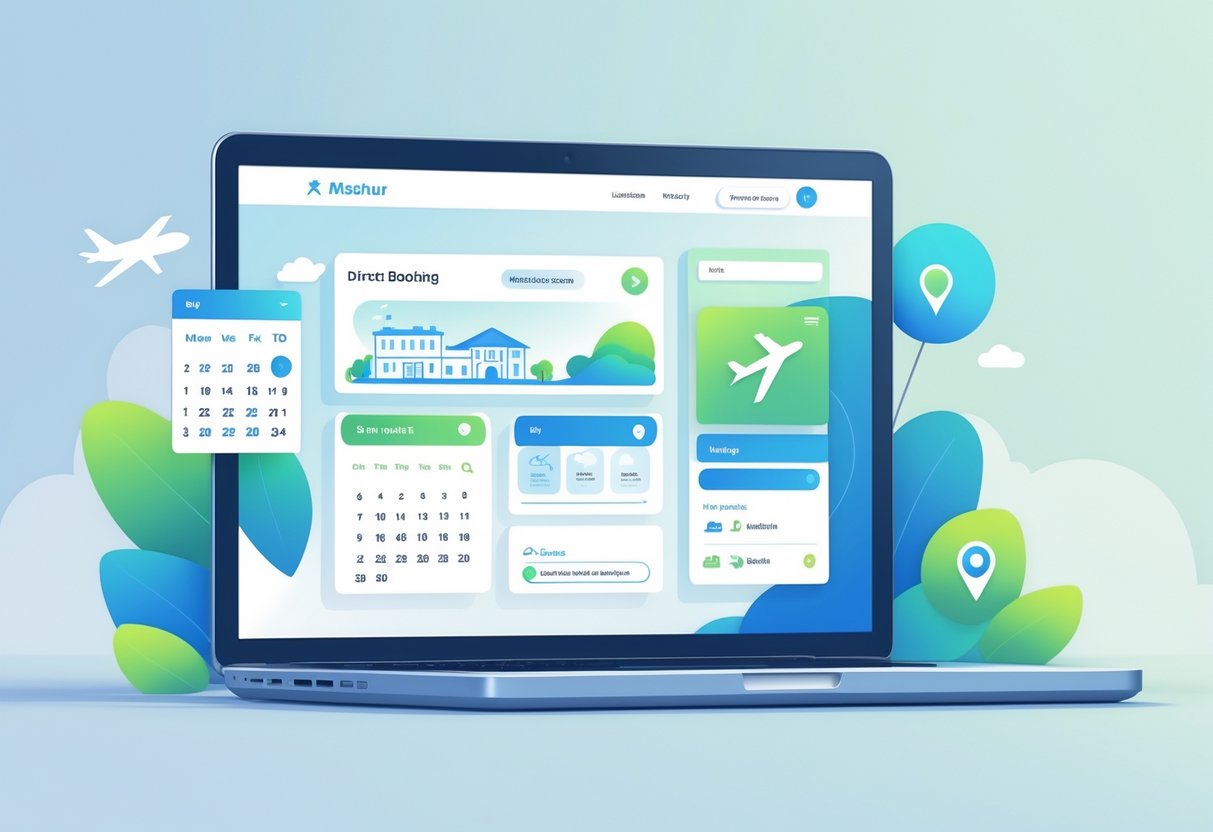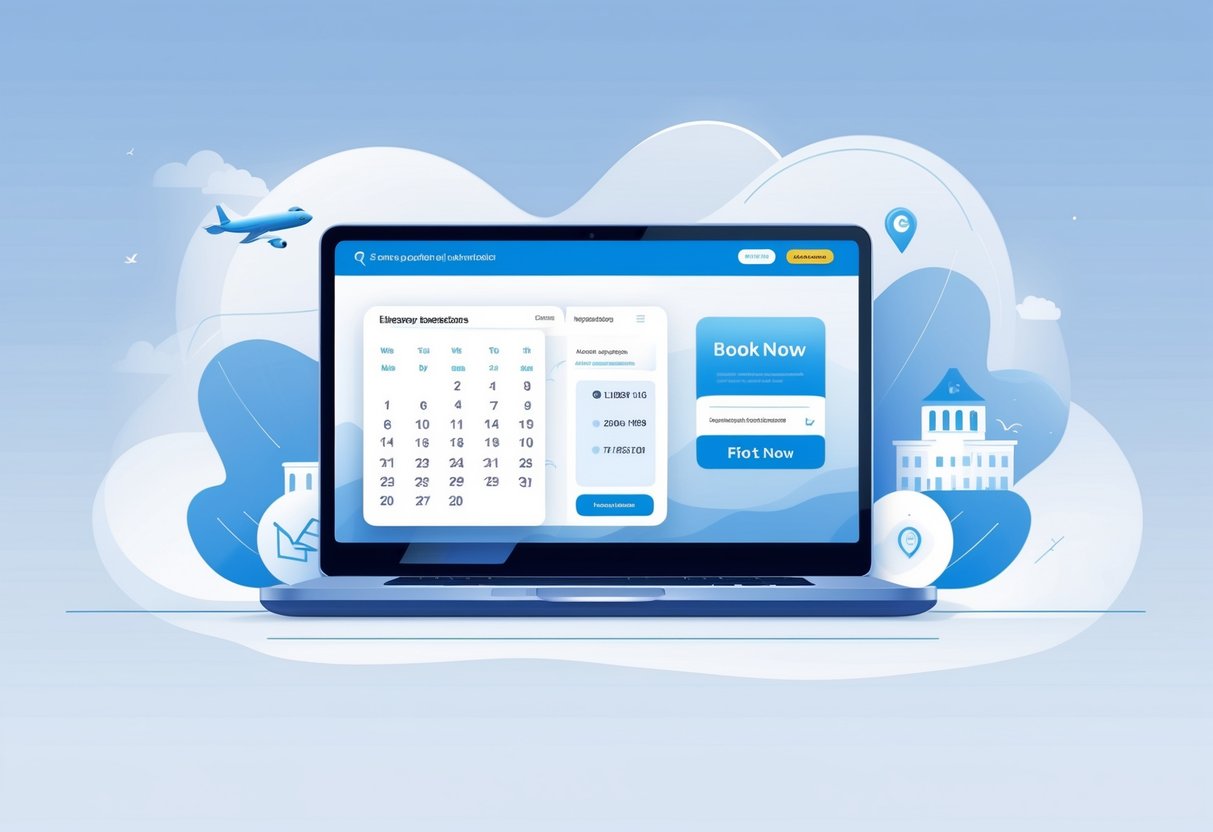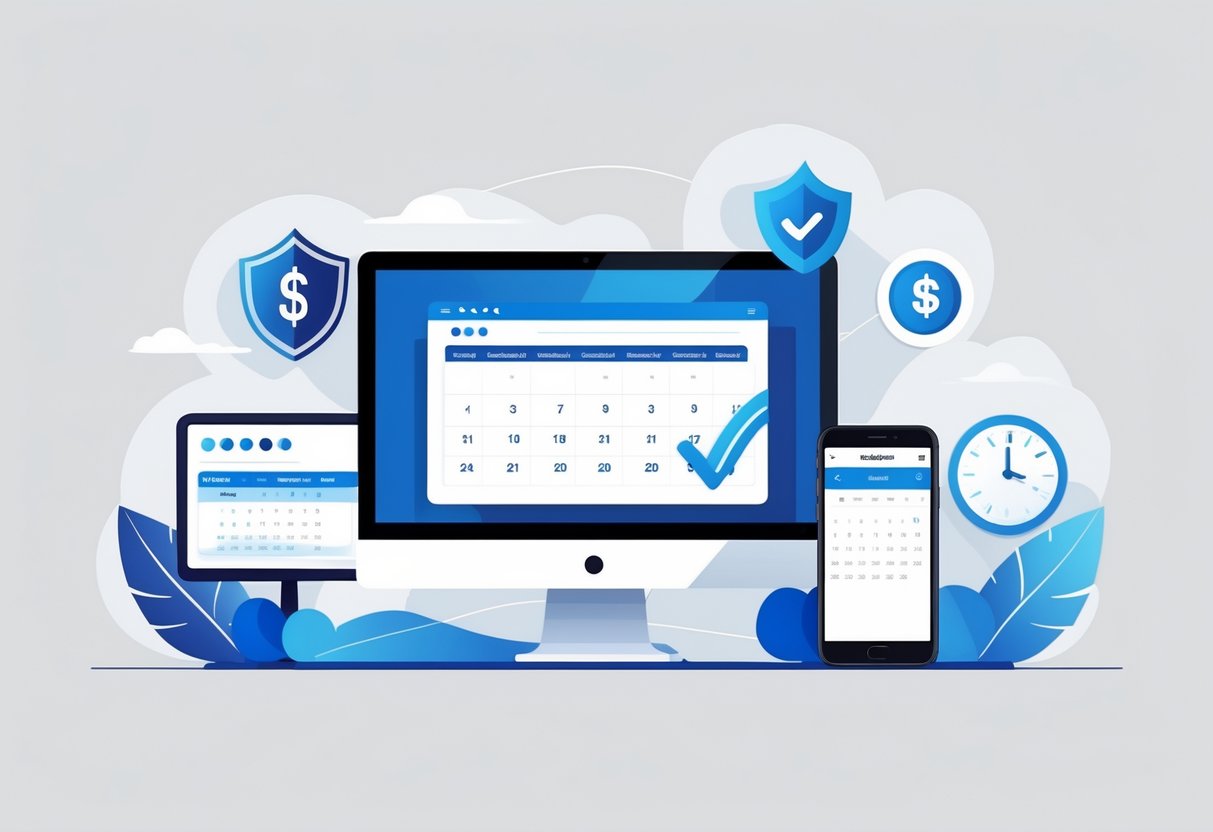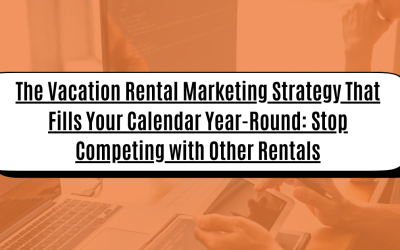Short-term rental operators lose thousands a year just in commission fees to platforms like Airbnb and Booking.com. A direct booking website cuts out these middlemen, letting guests reserve straight from the host’s own branded site.

The best direct booking websites blend user-friendly design, integrated payment processing, and smooth property management system connections. That combo can maximize bookings and cut down on operational headaches.
These platforms let property managers control guest relationships, pricing, and cancellation policies. You’re not at the mercy of someone else’s rules.
Modern direct booking website builders come with automated features that sync property availability, rates, and guest communications across channels. Once you get these systems up and running, you’ll usually see profit margins climb and your brand get more recognition—sometimes surprisingly fast.
Key Takeaways
-
Direct booking websites eliminate commission fees and give property managers full control over guest relationships and booking policies.
-
The best platforms integrate with property management systems and offer automated messaging, payment processing, and availability syncing.
-
Optimized direct booking sites with strong SEO and user-friendly design can really bump up your profit margins and help build your brand.
What Is a Direct Booking Website?

A direct booking website lets guests reserve accommodations without third-party platforms. That gives property owners total control over the booking process and wipes out commission fees from intermediaries.
Definition and Purpose
A direct booking website is owned and operated by the property. Guests book directly—no third parties needed. These sites work for hotels, vacation rentals, and short-term rental properties.
The main goal? Revenue optimization. Property owners avoid those 10-20% commission fees OTAs love to charge. They set their own prices, cancellation policies, and handle guest communication their way.
Direct booking websites save both property owners and customers money by dodging third-party fees. Owners can offer better rates and still keep more profit.
These websites double as brand-building tools. Property managers can show off what makes them special, highlight amenities, and create personalized guest experiences that set them apart.
Comparison With OTA Platforms
Direct booking websites don’t work like OTA platforms such as Airbnb or Booking.com. Here’s how they stack up:
| Direct Booking | OTA Platforms |
|---|---|
| No commission fees | 10-20% commission fees |
| Full pricing control | Limited pricing flexibility |
| Direct guest communication | Restricted guest contact |
| Complete brand control | Limited branding options |
| Guest data ownership | Limited guest data access |
OTA platforms do give you more eyes on your property, but they limit your control. Third-party sites often provide competitive prices and convenience for travelers shopping around.
Direct booking websites take more marketing hustle to attract guests. But the traffic you get is more likely to convert, since visitors already know your property or brand.
How Direct Bookings Work
The direct booking process starts when guests land on your site. They browse what’s available, pick dates, and check real-time availability using the booking engine.
The booking flow usually looks like:
-
Property selection and date entry
-
Rate comparison and package options
-
Guest info collection
-
Secure payment processing
-
Instant confirmation
Modern booking engines sync with property management systems to prevent double bookings. They update availability everywhere as soon as someone books.
Guests pay you directly—no waiting around for third-party payouts. That means you get your money faster.
Guest CRM systems collect valuable data like emails and preferences. OTAs usually hide this info, but with direct bookings, you can use it for targeted marketing and better service.
Key Benefits of Using Direct Booking Websites

Direct booking websites offer three huge advantages: bigger profit margins, stronger guest relationships, and total control over your brand.
Increasing Profit Margins
You skip those painful commission fees when guests book directly. Vacation rental owners can offer better rates to guests since they’re not paying middleman fees.
Third-party platforms charge 10-20% commission on every booking. If you make $50,000 a year, you might save $5,000-$10,000 just by getting more direct bookings.
Direct bookings also open up new revenue streams. Offer upsells like early check-in, late checkout, or local experiences—no need to share those profits.
Transparent pricing eliminates hidden fees that third-party sites sometimes sneak in. Guests see exactly what they’re paying, which builds trust and cuts down on abandoned bookings.
Building Guest Relationships
Direct bookings let you collect guest data that third-party platforms often hide. You get emails, preferences, and contact info for future marketing.
You can actually communicate with guests—send custom pre-arrival instructions, local tips, or follow-ups. That’s impossible with most OTAs.
Repeat bookings go up when guests book directly. You can offer loyalty discounts or perks to returning guests, no platform restrictions.
Feedback comes straight to you instead of getting filtered through third-party reviews. That helps you fix problems fast and improve service.
A vacation rental website lets you run targeted email campaigns for promotions or last-minute deals. Handy when you need to fill gaps.
Brand Control and Recognition
With your own site, you control how your brand looks and feels. Pick your colors, messaging, photos, and booking policies—no platform telling you what’s allowed.
Branded searches increase when guests recognize your business name. Instead of searching “vacation rental London,” they’ll look for “Urban Retreats London.”
Consistent branding across all guest touchpoints makes you stand out. You’re not just another listing in a sea of rentals.
Direct booking systems avoid double bookings by updating availability in real time. You can sync calendars everywhere but still keep your main booking engine in control.
A sharp, professional website builds guest confidence. Custom cancellation policies, secure payments, and branded confirmation emails make the experience feel premium—and justify higher rates.
Essential Features of the Best Direct Booking Website
The best direct booking sites mix powerful technology with a friendly, easy-to-use design. You want something that works well, looks good, and doesn’t confuse your guests.
Integrated Booking Engine
A solid booking engine is non-negotiable. It handles real-time availability, pricing calculations, and reservations—no need for guests to jump to a different site.
The booking engine should sync instantly with your property management system to block double bookings. It needs to show accurate availability for all your properties and update automatically if someone books through another channel.
Must-have booking engine features:
-
Real-time calendar sync
-
Automated pricing and seasonal adjustments
-
Multi-property support
-
Instant confirmation emails and receipts
Advanced engines even let you upsell during booking—think early check-in or cleaning fees. Guests can add extras right in the form.
You’ll want support for complex pricing, like minimum night stays or weekend premiums. Integrating with a channel manager keeps things consistent across all your booking platforms.
Customizable Website Design
Custom design lets you show off your brand’s personality. The site should look like you—not a cookie-cutter template.
You’ll want options for color schemes, fonts, layouts, and where images go. You should be able to edit the homepage, about section, and property descriptions without needing a web developer.
Key customization features:
-
Brand logo and color choices
-
Custom menus and layouts
-
Property-specific landing pages
-
Guest review displays
-
Local area info sections
Pre-built templates are useful, but you still need flexibility. That way, you can get started fast but tweak things to match your brand.
Photo galleries matter a lot. High-quality images with zoom help guests picture their stay—and boost confidence to book.
Mobile Usability and SEO Optimization
Mobile optimization is a must. Over half of bookings now happen on phones or tablets, so your site has to work well on small screens.
Mobile sites should load fast and be easy to navigate. Booking forms need to be touch-friendly and streamlined.
Mobile optimization checklist:
-
Loads in under 3 seconds
-
Easy-to-tap forms and buttons
-
Compressed images that still look sharp
-
Simple menus for phones
SEO matters, too. SEO-optimized websites show up higher in search results and bring in organic traffic.
Technical SEO means using good page titles, meta descriptions, and structured data. Local SEO—like Google My Business—helps you show up in location-based searches.
Content should include keyword-rich property descriptions and local guides. That’s good for guests and search rankings.
Secure Payment Processing
Secure payments build trust and protect sensitive financial info. Your system needs to meet industry security standards and offer multiple payment options.
PCI DSS compliance keeps credit card data safe. SSL certificates encrypt everything sent between the guest and your site.
Payment security essentials:
-
PCI DSS certified processors
-
SSL encryption
-
Secure tokenization for stored data
-
Fraud detection tools
Offer several payment options: major credit cards, PayPal, and whatever’s popular in your market.
Keep the payment process short and sweet, but secure. One-click payments for returning guests help boost conversions.
Show all fees, taxes, and charges upfront—no surprises at checkout. Clear refund and cancellation policies help guests feel safe booking directly.
Top Direct Booking Website Builders and Software
Several platforms lead the direct booking website scene, each with their own perks for rental operators. CraftedStays stands out with a 25-minute setup, while old pros like Lodgify and Guesty offer deep property management integration.
Overview of Leading Platforms
The best direct booking website builders for short-term rentals differ a lot in setup time, price, and features. CraftedStays claims the fastest setup—25 minutes—and conversion rates 40-70% better than basic PMS sites.
ICND (InterCoastal Net Designs) caters to big portfolios with 25+ years in the game. Their solutions run $5,000-12,000 upfront and $400-600 monthly, but they’re built for folks with 50+ properties.
Hudson Creative Studio targets luxury brands with custom designs starting at $8,000. Setup can take 8-12 weeks, but you’ll get a one-of-a-kind look.
WordPress with rental plugins is for tech-savvy hosts who want max flexibility. Setup costs $1,000-3,000 and ongoing expenses run $50-200 a month.
Hostfully is the budget pick, offering free basic sites. You get essential booking features with no monthly fee, but customization is limited.
Comparison: Lodgify, Guesty, Floorspace
| Platform | Setup Time | Monthly Cost | Best For | Key Features |
|---|---|---|---|---|
| Lodgify | 2-3 days | $140-400 | Mid-size operators (10-50 properties) | Multi-language support, channel management |
| Guesty | 1-2 weeks | $120-350 | PMS-focused operations | Advanced property management, automation |
| Floorspace | 1-3 days | $99-249 | Growing rental businesses | Integrated booking engine, mobile optimization |
Lodgify stands out for website building with booking systems aimed at international operators.
The platform supports multiple currencies and languages, and it connects with major PMS systems.
Guesty leans heavily into property management but throws in some website-building tools too.
Their real strength? Automation and multi-channel distribution, not so much fancy website design.
Floorspace goes after growing vacation rental businesses that want a quick, no-fuss setup.
They really focus on conversion optimization and mobile-first design, which honestly feels essential these days.
Evaluating Platform-Specific Integrations
Most vacation rental website builders now connect with popular PMS platforms like Hostfully, OwnerRez, and Hospitable.
Real-time availability sync keeps double bookings at bay across all channels.
CraftedStays, for example, pulls in property data automatically during its 25-minute setup.
It keeps pricing and availability up-to-date without you needing to babysit it.
If you’re using WordPress, you’ll need extra plugins for PMS integration—think WP Rentals or RnB—but be ready for more complicated setup.
API quality jumps around between platforms.
Enterprise options like ICND can build custom APIs for complex needs, while budget platforms might only offer basic or slower syncs.
Payment processor integration matters for conversion rates.
The top platforms support Stripe, PayPal, and direct credit card payments with mobile-friendly checkouts.
Optimizing Your Direct Booking Website for Maximum Results
Smart optimization? It’s really about three areas: technical performance for search visibility, strategic revenue enhancement with targeted offers, and operational systems that keep booking conflicts from ruining your day.
SEO and Website Performance
Search engine optimization is the backbone of any successful direct booking website.
Using the right keywords, writing sharp meta descriptions, and adding structured data all help boost visibility and pull in organic traffic.
Mobile responsiveness isn’t optional anymore—most travelers book on their phones.
If your site loads slowly, guests will bail before you can say “reservation.”
Technical SEO elements you shouldn’t ignore:
- Meta descriptions under 150 characters
- Rich snippets with structured data
- Open Graph tags for sharing on social
- Fast page loading (seriously, don’t skimp here)
Strong content does double duty: it helps with SEO and builds guest trust.
Add detailed FAQ sections, local area guides, and clear booking steps to make life easier for guests—and Google.
Utilizing Upsells and Ancillary Revenue
Upsells are a goldmine for direct booking sites, but so many hosts overlook them.
If you offer upgrades at the right time, you can bump up average booking values by 15-25%.
Some of the best upsell ideas:
- Room upgrades with nicer amenities
- Extended stays (discounted, of course)
- Local experience packages or tours
- Transportation services and parking
Modern PMS systems can automate upsell offers based on guest profiles and booking patterns.
Timing is everything—show upsells after a guest picks their stay, but before they pay.
You can also earn more with breakfast packages, late checkout, or partnerships with local businesses.
Managing Double Bookings Effectively
Channel managers are your best defense against double bookings.
They sync availability across all your platforms in real-time, so you don’t have to worry about someone booking the same dates twice.
Property management systems with built-in channel management cut down on manual mistakes and keep your calendars accurate.
Most sync within 2-5 minutes on major platforms.
Prevention strategies to consider:
- Automated inventory updates everywhere
- Buffer times for cleaning or turnover
- Overbooking protection with custom settings
- Manual override for those odd situations
If you do get a double booking, reach out to guests immediately and try to arrange alternatives.
It helps to have a network of nearby properties for backup.
Connecting Direct Booking Websites to Channel Managers and PMS
Owners need smooth integration between their booking sites and management systems.
Real-time sync across all platforms keeps things running smoothly and avoids awkward booking errors.
Syncing Calendars Across Platforms
Calendar sync keeps your availability current across every channel.
Property management systems send real-time updates to your direct website, Airbnb, Vrbo, and others.
Most PMS platforms now offer two-way sync.
When someone books on your site, those dates get blocked everywhere else—no drama.
Key sync features:
- Instant updates to availability
- Rate changes pushed everywhere
- Booking confirmations
- Cancellation alerts
Choose systems that update within minutes.
Long delays? That’s just asking for trouble.
Avoiding Double Bookings
Double bookings usually happen when calendar sync lags or fails.
Reliable property management systems with real-time inventory updates are your best bet.
The smartest systems use instant blocking—when a guest starts booking, the system holds those dates so nobody else can grab them.
Protection strategies:
- Set buffer times between stays
- Use auto-blocking for calendars
- Enable instant notifications
- Keep manual override handy for emergencies
Test your sync speed regularly.
Send test bookings through different channels and see if everything updates instantly.
Utilizing Channel Manager Integrations
Channel managers tie your direct booking site to all the big platforms from one dashboard.
You can manage inventory, rates, and availability for Airbnb, Vrbo, and others at the same time.
Channel manager integrations work best if your PMS is compatible.
This creates a single system for handling all reservations and guest info.
Integration perks:
- One place for all bookings
- Automated rate changes
- Single calendar control
- Unified reports
Double-check that your channel manager offers two-way connectivity.
That way, bookings and updates flow both ways between your site and external platforms.
The most efficient setups use channel managers alongside robust PMS systems.
It’s the best way to control pricing, availability, and guest communication everywhere.
Frequently Asked Questions
Property managers need the right features and strategies to boost revenue from their booking sites.
Knowing what integrations work, which options are affordable, and what tactics actually move the needle helps you make smarter choices.
What features should I look for when choosing a direct booking website for vacation rentals?
Look for a built-in booking engine with real-time availability and secure payments.
Platforms offering commission-free direct bookings, automated messaging, and analytics really streamline your workflow.
Multi-property branding lets you show off your whole portfolio under one brand, which is a lifesaver for hosts in multiple cities.
SEO tools help you rank higher when guests search for your business—and don’t forget about multi-currency support for international bookings.
Dynamic content updates keep your listings fresh.
Some platforms even pull in reviews from other sites to build trust with new guests.
How can I increase direct bookings for my short-term rental property?
Consistency is key—use the same business name everywhere, from Airbnb to your direct site.
Add direct booking links to guest emails, welcome books, and even signs in your rentals.
Running cheap Google Ads for your business name can help you catch guests who already know you.
Publishing local content on your site drives organic search traffic.
Collect Google Reviews under your business name to build credibility and encourage more direct bookings.
Branded searches tend to convert better since those guests already want to book with you.
What are the advantages of using a direct booking website over third-party platforms?
Direct booking sites cut out commission fees, which can be 3% to 15% per booking.
That’s money back in your pocket.
You control cancellation policies, guest screening, and pricing—no more bending to someone else’s rules.
Direct bookings also give you guest data, like emails and preferences, which third-party sites usually hide.
This info is gold for targeted marketing and repeat business.
Building loyalty and guest satisfaction gets easier when you’re in direct contact.
You can offer personalized service and keep the conversation going after checkout.
Are there any free direct booking websites that are reliable and efficient?
Most solid booking platforms charge monthly fees—they cover hosting, payments, and support.
Free options usually mean limited features or more headaches during setup.
If you’re on a budget, look for low-cost platforms instead of free ones.
Paid options almost always deliver better support, security, and booking engines.
Some PMS packages come with basic website builders included—not totally free, but often better value than stand-alone builders.
Free sites often skip essentials like secure payments or real-time updates.
And if you hit a technical snag, support might be nonexistent.
What strategies can I employ to build a successful direct booking website for my rental business?
Start with consistent branding—same name, logo, and voice everywhere.
Optimize your site for SEO and guest trust by using location-specific pages, schema markup, and URLs that match your business name.
Track your branded search volume and booking revenue.
Google Search Console can show you how often people search for your name.
Offer vouchers and promos for direct bookings to nudge guests away from third-party sites.
Try exclusive deals like longer stays, early check-in, or local experiences—whatever makes your place stand out.
How do direct booking websites integrate with other services like Airbnb for streamlined management?
Most direct booking platforms sync with major third-party sites to avoid double bookings. When guests reserve a spot, the system updates availability everywhere.
Property management systems with integrated direct booking websites can pull in listing details, photos, and descriptions straight from Airbnb accounts. This saves property managers a ton of setup time.
Calendar syncing usually happens in real-time. If someone books a night, all platforms show the change within minutes.
Some platforms even let property managers show Airbnb and other site reviews on their direct booking website. That’s a handy way to build trust with new guests who might be a little hesitant.





0 Comments